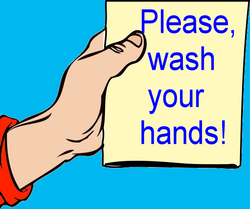
During the early part of the 1800’s the idea of airborne germs was not part of our medical knowledge. But Louis Pasteur changed that and with the collective work of Ferdinand Cohn and Robert Koch, developed the field of bacteriology. Pasteur is best known for his technique of raising the temperature of materials susceptible to bacterial growth to kill resident germs now called pasteurization. However, Pasteur’s real contribution to the field of bacteriology was in the repudiation of what was called “spontaneous generation”. This theory held that small unseen germs would spontaneously grow in any condition. Pasteur performed a simple experiment with growth media that was free of any contamination. He used two flasks and in one the top was left open. In the other, the flask was sealed. The open flask grew many germs and the sealed one had none, proving that germs were airborne. Pasteur is now recognized as the father of microbiology
Based on this knowledge, Joseph Lister introduced the use of carbolic acid (phenol) into the science of surgery. He used it to clean all instruments and the hands of all persons in the surgical procedure. Both infection and mortality went down significantly. But, this idea of cleanliness was slow to filter down to the general public.
Fast forward to today and we are all aware of the importance of hand washing as a general strategy of reducing illness. There have been may TV stories of testing various places in the home and what grows on many surfaces. We are even told to wash X number of times to the song happy birthday as if we were in preschool. But, the consequences of not washing our hands are clear and apparent but many people simply fail to take this simple advice.
I have grown many samples of germs and they are literally everywhere. But, not all germs are bad germs. But I have a general guideline that I use and it seems to work. I consider how many people have had contact with anything that I handle. A good example is paper money. That has a potential for many hands with bad things attached. Shopping carts at the supermarket, ATM touch screens, and of course, public bathrooms. We can’t be washing our hands every 30 seconds but if we don’t put our contaminated hands near our eyes, nose, or mouth, we can reduce potential illness. It seems that we should have learned about good hygiene over the past 150 years…

 RSS Feed
RSS Feed
